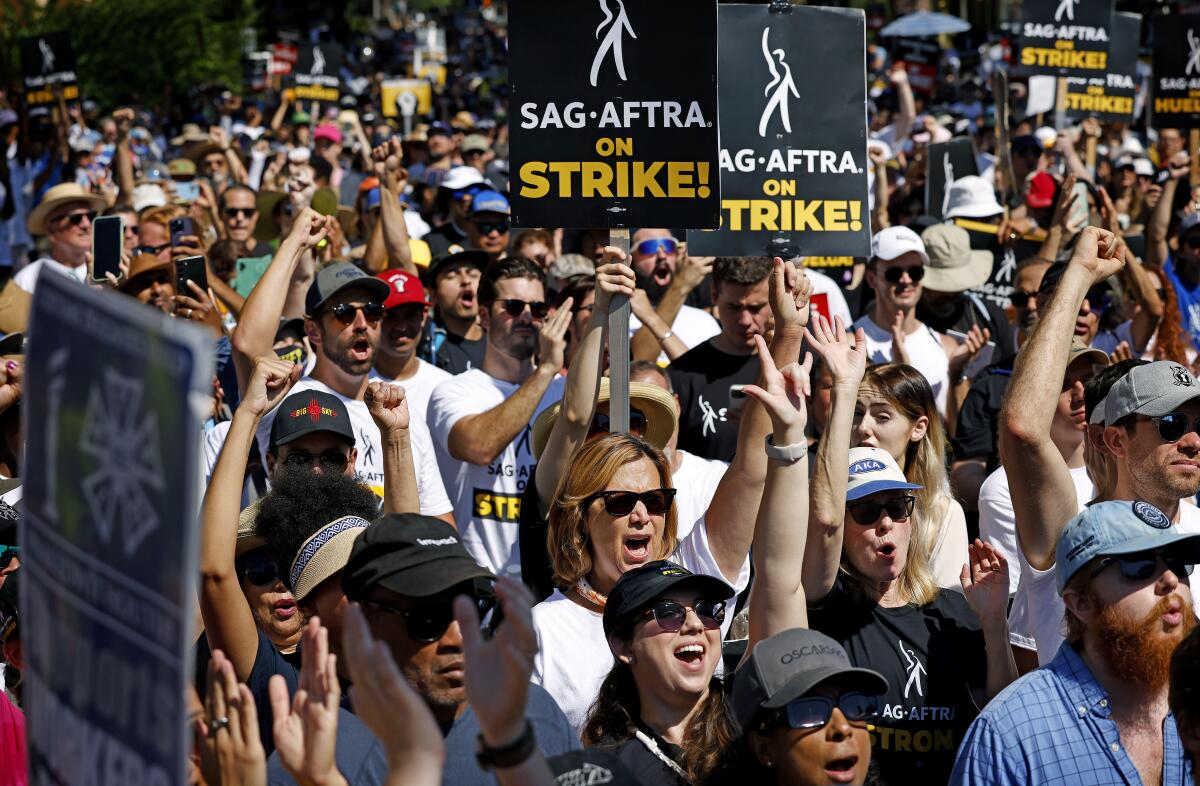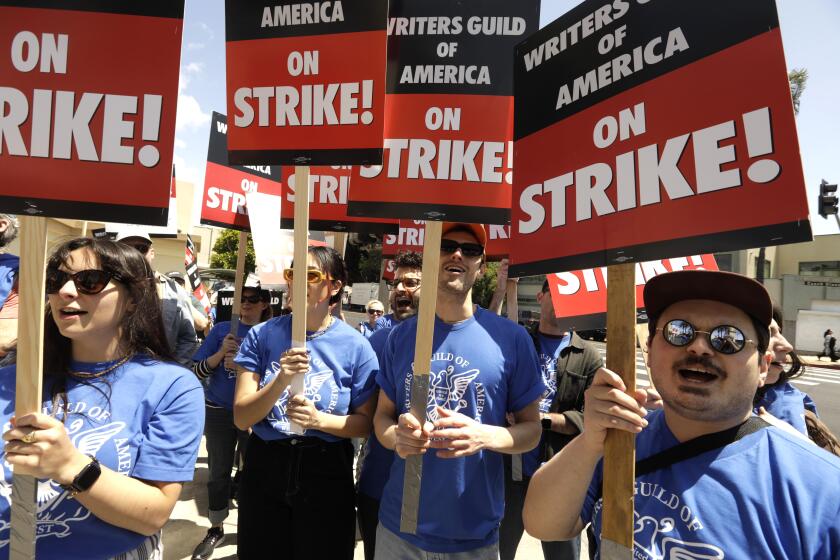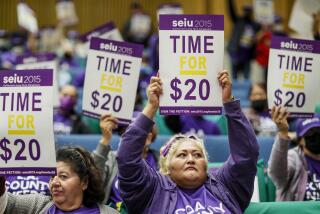As Hollywood strikes drag on, California lawmakers consider unemployment pay for striking workers

- Share via
California lawmakers are resurrecting legislation that would allow workers on strike to collect unemployment benefits, reigniting a familiar political battle between labor unions and businesses.
Under Senate Bill 799, striking workers would be eligible to collect unemployment benefits after they’re on strike for two weeks, an early version of the bill released on Tuesday shows.
“Even coming out of the strike, when folks eventually get a contract that they agree on, their families have suffered during this time,” said Sen. Anthony Portantino (D-Burbank), who wrote the bill.
The last-minute effort, backed by labor unions, shows how lawmakers are responding to a wave of worker strikes sweeping California. Hollywood writers, later joined by actors, have been on the picket lines for more than 100 days demanding better pay and benefits. Public school workers, hotel staffers, nurses and even Los Angeles city workers also went on strike this year in Southern California.
Striking union members in most states don’t qualify for unemployment benefits. In California, workers must meet requirements to qualify for unemployment benefits, such as showing they are unemployed through no fault of their own and actively searching for a job. To pay their bills, workers on strike usually rely on personal savings, strike funds, side gigs and other financial aid.
New York and New Jersey, though, do allow certain workers on strike to collect unemployment benefits. Lawmakers in states such as Massachusetts, Connecticut and now California are considering similar policies.
Along with expanding eligibility for unemployment benefits, California lawmakers are considering several other bills to aid workers grappling with the rising cost of living. Democrats have introduced legislation that would raise the minimum wage for healthcare workers to $25 per hour and more than double the amount of paid sick leave. The California Chamber of Commerce labeled the bills “job killers.”
The chamber opposes allowing striking workers to collect unemployment pay in California, which is as much as $450 per week for a maximum of 26 weeks, stating it would harm businesses.
“This is going to hit employers, even those who have no involvement at all in any labor dispute and never have, but they’re still going to pay increased taxes,” said Robert Moutrie, a policy advocate at the California Chamber of Commerce.
There are several funds available that can provide temporary assistance for those in dire financial situations due to the strike.
Businesses pay state and federal payroll taxes on each employee’s first $7,000 in annual wages to fund the unemployment insurance program.
Portantino said his legislation could help fuel more conversations about how to better finance the state’s unemployment fund.
“The level of taxable income is low,” Portantino said. “This is the time to maybe look at that level of income to raise it to make sure that the fund is solvent.”
California is paying out more unemployment benefits than it has collected in state payroll taxes, according to the Legislative Analyst’s Office.
In 2020, amid higher-than-average job losses during the coronavirus pandemic, California borrowed $20 billion from the federal government to fund unemployment claims. The amount of federal unemployment insurance taxes California employers pay increases every year by an extra $21 per employee until the loan is repaid. The state also has to pay interest on these federal loans.
The proposed legislation was first reported by Politico. Although the official deadline for introducing new legislation has passed, the proposal is being introduced by gutting an existing bill and replacing the language with the measure to expand unemployment benefits.
Lawmakers will have to weigh business and labor interests. California Gov. Gavin Newsom has stayed behind the scenes as the Hollywood strikes drag on and has been cautious about any appearance that he’s taking sides. Newsom has been hesitant to support new spending proposals, however, given that he and lawmakers recently agreed on a budget plan that closes a nearly $32-billion deficit. The governor’s office didn’t respond to questions about whether it would support the bill.
Labor unions, including SAG-AFTRA and the Writers Guild of America, support the bill.
“Years of eroding compensation and working conditions have left writers with fewer resources than ever to weather periods without work,” Meredith Stiehm, president of Writers Guild of America-West, said in a statement. “Unemployment insurance for striking workers is a commonsense solution to keeping workers afloat and local economies healthy.”
California lawmakers proposed a similar bill to give striking workers unemployment benefits in 2019, but AB 1066 failed to pass the Senate. Various business groups opposed the legislation, saying it could force the state to take out more federal loans and penalize employers for strikes.
At the time, the Employment Development Department estimated that the amount of additional unemployment benefits paid could range from $800,000 to $6 million annually, according to the bill’s analysis. The impact depends on the number of employees who collect unemployment benefits and how long the strikes last.
Former state Assemblymember Lorena Gonzalez, who leads the California Labor Federation, said owing the federal government money shouldn’t be an excuse for not providing unemployment pay to workers.
“If you’re in Los Angeles, obviously you’re seeing workers go without a paycheck for an extended amount of time, and slowly finding out what that means,” she said. Gonzalez said she’s seen the effect long strikes have had on workers, pointing to the nearly five-month grocery worker strike in the 2000s. Anonymous studio executives told Deadline that their strategy is to drag out the strikes until workers go broke, but the Alliance of Motion Picture and Television Producers disputed the report.
“They want them to be evicted. I mean, that’s crazy. That is exactly what we don’t want. They have earned unemployment insurance, and they should be able to access unemployment insurance,” Gonzalez said.
The amount in strike funds, she said, varies based on the union and can be depleted. Allowing workers to collect unemployment benefits isn’t about tipping the scale in favor of the workers but being “humane” and providing them a social safety net.
“This really just keeps people afloat,” she said.
More to Read
Sign up for Essential California
The most important California stories and recommendations in your inbox every morning.
You may occasionally receive promotional content from the Los Angeles Times.












